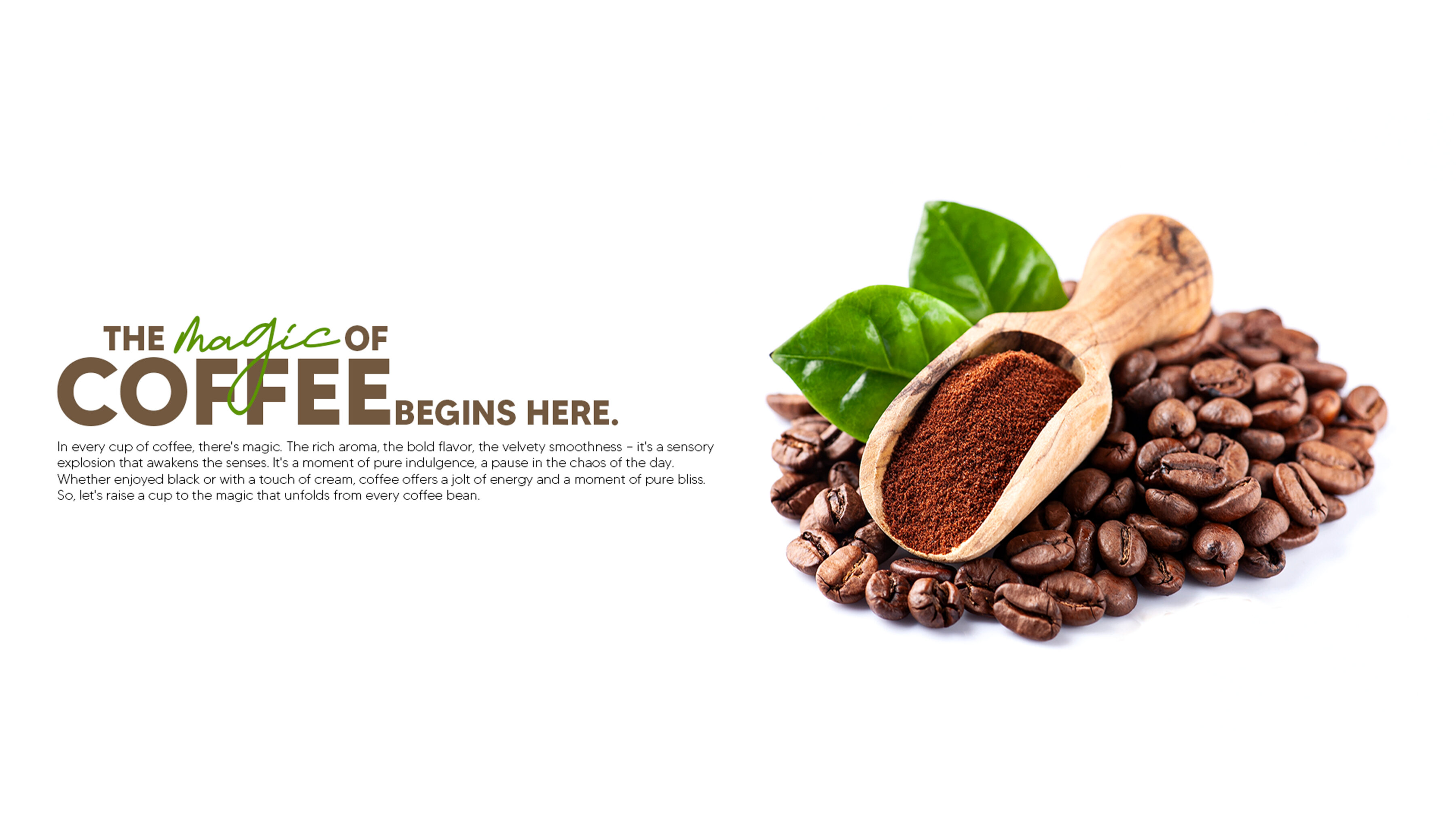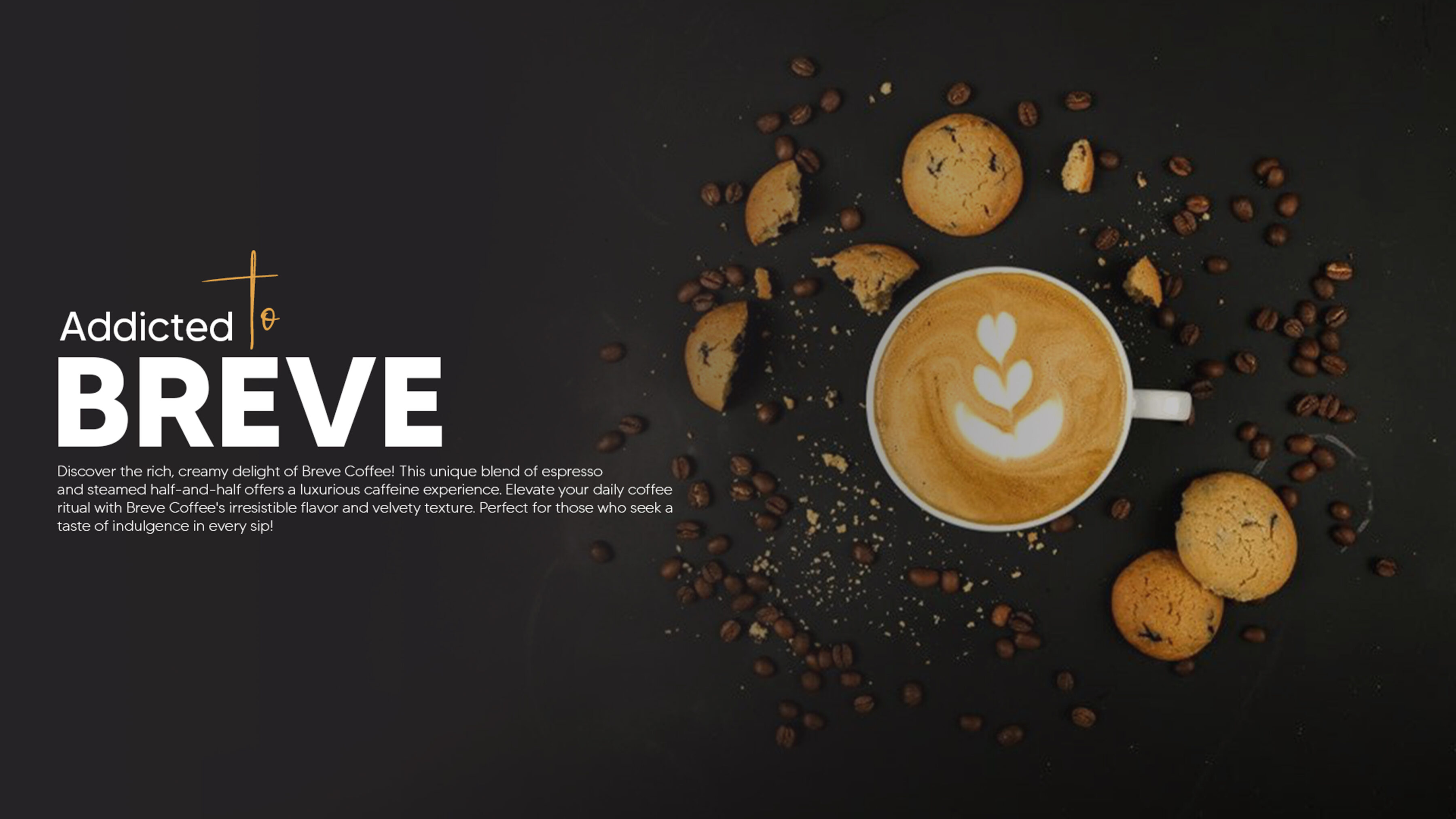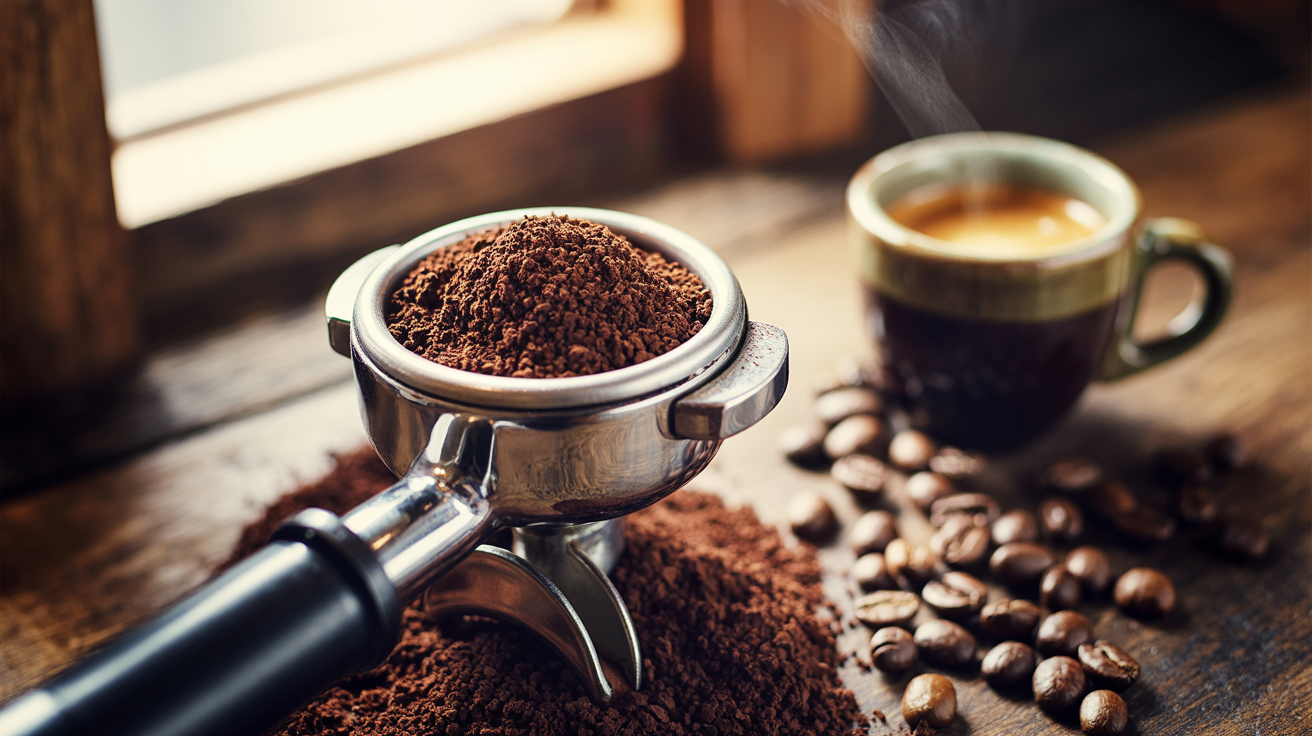Discover the Richness of Colombia Coffee: A Complete Guide Discover the Richness of Colombia Coffee: A Complete Guide Introduction to...
Read MoreChildrens Coffee That Supports Brain and Body Growt

Childrens Coffee That Supports Brain and Body Growt


Introduction: Understanding Childrens Coffee
Brief introduction to the topic of childrens coffee.
Childrens coffee is the new trend that is full of fun, flavor and kid-friendly ingredients to enjoy but minus the caffeine and tailor made for the littles! It is caffeine-free, unlike coffee, it brings kids a coffee experience but is totally safe, perfect for children to develop a healthy lifestyle at an early age. Parents love this unique alternative as it promotes socialization and creativity during play dates and family get-togethers. Most brands emphasize the quality of their ingredients, often including natural and organic ones, which are promoted for health and taste bud health. As consumer knowledge of healthy kids’ drinks expands, kids coffee becomes more widespread, mirroring the shift in consumer tastes and desire for offerings the whole family can both drink and share.
The Effects of Coffee on Kids
How Does Coffee Affect Children?
Caffeine has a strong effect on children, with only small amounts of it having an adverse effect. Children, who are in a period of rapid development and so are more sensitive to stimulants, may suffer from increased heart rates, anxiety, disrupted sleep, headaches, or stomach upset. The effects of coffee on kids can also involve dehydration and reduced absorption of essential nutrients, such as calcium, which is vital for growth and healthy bones. The lasting worries stem from data showing that the students experience disruptions in sleeping, mood, and attention. This is why most health authorities advise against children consuming regular coffee at all. Childrens Coffee, which doesn’t actually contain caffeine, is viewed as a safer alternative that sidesteps these health risks.
Explore the impact of caffeine on children’s developing bodies and minds.
As kids get older, caffeine can have a significant effect on their bodies and minds. Kids are more sensitive to caffeine because they are smaller and their brains are still growing. If you overreact, you might feel shaky, have a fast heart rate, and be very worried. Again, caffeine messes up sleep, which stops essential things that are needed for emotional control and brain growth. Researchers have also found that kids who drink a lot of caffeine may have trouble learning, remembering things, and paying attention. Caffeine may also make it harder for the body to absorb calcium, which can slow down bone growth. Parents should be careful about how much caffeine their kids consume in coffee to help their bodies and brains grow in a healthy way.
Is coffee ok for Kids with ADHD?
Can Coffee Help Kids with ADHD?
Coffee’s influence on children with ADHD is not clear-cut and is not endorsed by health experts. Although caffeine may initially heighten focus and attention in some instances, its effects differ widely for children with ADHD, often leading to increased anxiety, difficulty sleeping, and fidgety behavior. These side effects may also be making things worse, not better. Medically, caution should be the order of the day, and a person-by-person evaluation of whether caffeine is a valid dietary option. Most doctors favor treatments backed by evidence, such as behavioral therapy or prescribed medication. Seems like a dangerous game, doesn’t it? That’s why Childrens Coffee or other caffeine-free alternatives are safe options because there is no risk of harmful effects, so your kids can enjoy a coffee-like experience without interfering with their health or ADHD treatments.
Explore how caffeine may affect kids with ADHD.
There is a much broader debate about the effect of caffeine on children with ADHD among professionals. Although some studies say caffeine can momentarily improve attention, focus, or mood, randomized controlled trials consistently show no meaningful effects on the core symptoms of ADHD, like inattention, hyperactivity, or impulsivity, compared with a placebo. Stimulants are still the best way to treat this condition, even though caffeine is a much less effective and possibly dangerous option. Caffeine, for many children, will exacerbate anxiety, cause sleep disturbance, and side effects like irritability or stomach upset that are especially undesirable in growing kids. Health officials typically don’t recommend young people take up caffeine to treat ADHD, and instead use proven medical and behavioral treatment for the disorder.
Can Children Drink Decaf Coffee?
Decaf Coffee and Kids: Is It Safe?
Decaf coffee is often hailed as a safer option for children, as it contains only a fraction of the caffeine in regular coffee and just 2-5mg per 8-oz cup. But decaf formulations, the experts point out, are not entirely caffeine free, and children are even more sensitive to the substance than are adults. A small serving or rare sip may not harm, but regular use might contribute to mild restlessness, nervousness, or sleep difficulty in sensitive children. Coffee or decaf, even, isn’t typically something health authorities would recommend for children. Childrens coffee shop products, intentionally designed to contain no caffeine, provide a safe means for kids to enjoy coffee-like activities without exposure to adverse health effects.
Explain the difference between regular and decaffeinated coffee.
Caffeine, which stimulates the central nervous system, is present in regular coffee in good amounts (70–140 mg per cup, or 8 ounces). Caffeine can cause jitters, heart palpitations, and disturbed sleep, especially in sensitive people. However, decaffeinated coffee is subjected to a process that eliminates most of the caffeine, generally 97% or above, with only traces remaining. Although decaf keeps most of your coffee’s flavors, its smaller quantity of caffeine has popularized this alternative among those who prefer to mute the caffeine, like kids and hyper-caffeinated folks. Options such as Childrens Coffee, which are specially formulated without caffeine for young drinkers, follow this trend by offering the same cozy coffee-like experience without the stimulant. Both contain antioxidants, but caffeine has a unique health effect.
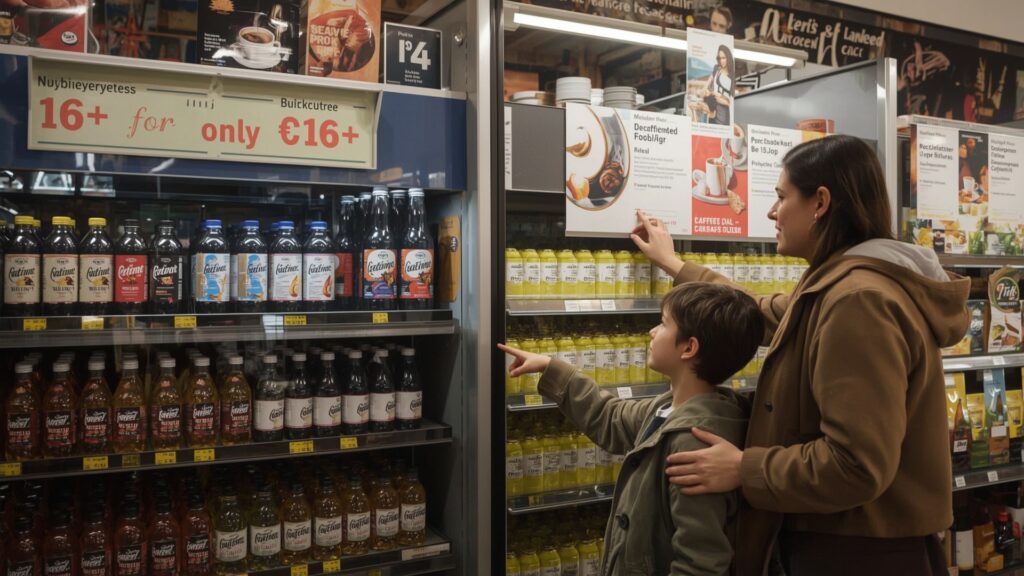
Legal Considerations: Coffee Age Restrictions in Europe
Are There Any Age Restrictions on Coffee for Children in Europe?
There are no specific EU-wide legal age bans on childrens coffee. Yet countries throughout Europe have implemented differing regulations, with a particular focus on high-caffeine beverages such as energy drinks. Poland, Lithuania, Latvia, and the Czech Republic, for instance, have all made sales of energy drinks to children, most commonly below 16-18 years old, illegal. Coffee, on the other hand, is not federally age-restricted, and oversight is based on voluntary guidelines and retailer policies. A 3mg caffeine per kg of body weight per day is the maximum safe intake for a child. Any product that is 150mg/liter is required to make the statement “not recommended for children”. Kids’ coffee, or a caffeine-free alternative, is typically considered the best option for children.
Establish Authoritativeness by referencing European laws.
European legislation and regulation are also fundamental in defining authority in relation to caffeine consumption by minors. The EFSA offers scientific advice and recommends that children maintain a caffeine intake of no more than 3 mg/kg body weight/day to be safe. There are no EU-wide rules enforcing an age restriction for coffee consumption per se, though several member states prohibit the sale of high-caffeine products (such as energy drinks) to persons younger than 16 or 18. Such regulations that endorse non-caffeinated alternatives like Childrens Coffee for children reflect the stance of the majority of health bodies across Europe, that youth should be protected from unnecessary exposure to stimulants like caffeine.
Expert Opinions on Children and Caffeine Intake
What Do Experts Say About Kids Drinking Coffee?
Most medical and nutrition professionals concur that children should stay away from caffeine because of its various risks to health. The American Academy of Pediatrics advises children under 12 to avoid caffeinated drinks like coffee, as do older children, as they should be consuming less than 100mg of caffeine a day. Among children, risks are higher heart rates, anxiety, insomnia, and inability to focus as they are more susceptible to drugs that stimulate. Though there is no federal law that makes a kid too young for coffee, international standards, like Canada’s guideline of 45mg a day for young children, point to expert caution. That’s why Childrens Coffee, as in a caffeine-free alternative, is often thought to be the safer choice, keeping their kids side effects free but still allowing them to have the same experience.
Expert opinions from pediatricians and nutritionists.
All pediatricians, including dietitians, generally agree that children should limit exposure to caffeine, as effects on growth and development have the potential to be negative. They cite risks such as increased heart rate, anxiety, and sleep problems, and even impaired focus, especially because children are susceptible to stimulants. Caffeine should be avoided by children under the age of twelve and consumed in moderation by adolescents, according to the American Academy of Pediatrics. Experts also stress that different people have different levels of caffeine sensitivity and that as the body develops a tolerance over time, the stimulant’s effects wear off. A call for stimulant-free alternatives like Childrens Coffee to protect the young body and brain is also made by the experts. Consensus is given to reduce childhood and adolescent caffeine intake for children’s health and normal physical and mental development.
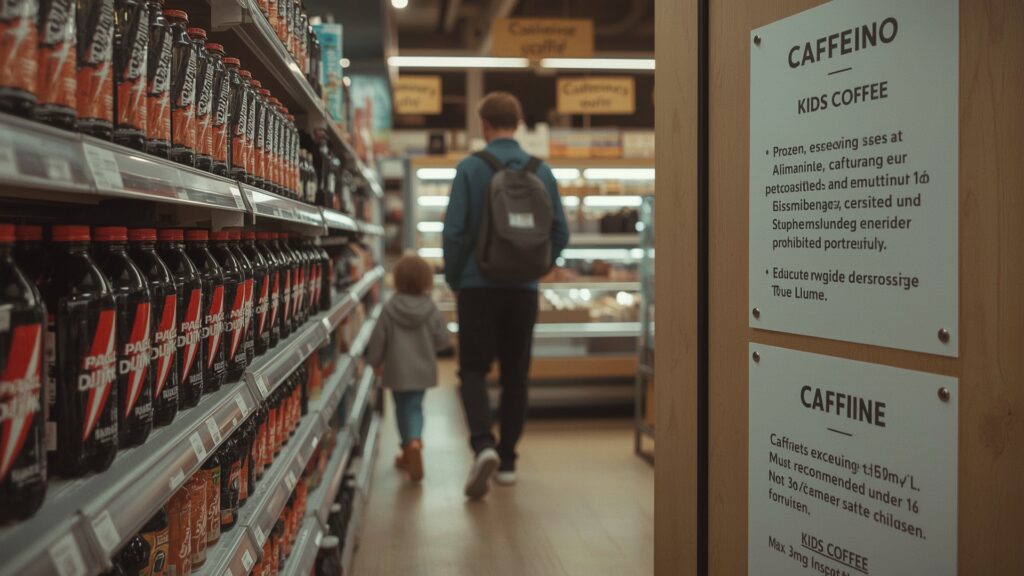
Is coffee ok for children to drink?
People don’t think it’s safe for kids to drink coffee. The NHS and the American Academy of Pediatrics both say that young people shouldn’t drink caffeine because it can cause side effects like a faster heart rate, trouble sleeping, anxiety, and less nutrient absorption. Experts say that parents should not give their kids coffee because it is not suitable for their growth and development. Instead, they should provide them with water and milk.
At what age can children have coffee in the NHS?
The NHS says that coffee is not suitable for babies and young children, and there is no set age at which coffee is recommended for kids in the UK. The NHS says that you shouldn’t give tea or coffee to young kids at all because caffeine can keep them from sleeping, make it harder for them to absorb iron, and hurt their growth. There is no law that says how old you have to be to drink caffeine, but health experts usually say that kids under 12 shouldn’t drink it.
Can a 7-year-old have a sip of coffee?
It is unlikely that a 7-year-old will be harmed by a small sip of coffee, but health experts and the NHS do not recommend coffee or other caffeinated drinks for kids this age. Caffeine can make it hard for young kids to sleep, make them more anxious, and make it harder for them to absorb nutrients. For the best growth and development, water and milk are still the best drinks.
Can children use coffee?
NHS and expert advice say that kids shouldn’t drink coffee. Drinks with caffeine, like coffee, can make it hard for growing kids to sleep, raise their heart rate, make them anxious, and make it harder for them to absorb nutrients. Health experts say that kids should stay away from coffee and instead choose healthier drinks like water or milk to help them grow and stay healthy.
Conclusion: Should Children Drink Coffee?
Coffee is not good for children to drink, so I would just say, on that basis alone, it’s not a good idea. Experts, including pediatricians and nutritionists, repeatedly note that caffeine can disrupt sleep, heighten anxiety, and affect heart rate in young, growing bodies. The NHS and other health bodies say children should try to avoid consuming caffeine, particularly children under the age of 12. Instead, Childrens Coffee, which contains no caffeine, offers a safe but fun way to grow up as adults do and get that ‘coffee’ feeling too! In any case, there seems to be general agreement that not giving your kids regular coffee is absolutely essential if you want to protect their bodies and minds.
Popular Posts
Coffee Beans: Discover the Best Beans for Every Brew
Unlocking the Secrets of Coffee Beans: Types, Roasting, and Brewing Unlocking the Secrets of Coffee Beans: Types, Roasting, and Brewing...
Read MoreWhite Coffee: The Unique Brew You Need to Try Today
Experience the Smooth Taste of White Coffee: Your New Favorite Drink! Experience the Smooth Taste of White Coffee: Your New...
Read MoreCortado Coffee: A Perfect Balance of Espresso and Milk
Cortado Coffee: A Perfect Harmony of Espresso and Milk! Cortado Coffee: A Perfect Harmony of Espresso and Milk! Introduction A...
Read MoreBreve Coffee: A Creamy Delight for Coffee Lovers
5 Surprising Benefits of Drinking Breve Coffee Daily 5 Surprising Benefits of Drinking Breve Coffee Daily Introduction Briefly introduce what...
Read MoreCoffee Specialist’s Guide to the Right Powder for You
Coffee Powder Guide: 7 Types Explained by Experts Coffee Powder Guide: 7 Types Explained by Experts 1. Introduction: Why Choosing...
Read More
Introduction: Understanding Childrens Coffee
Brief introduction to the topic of childrens coffee.
Childrens coffee is the new trend that is full of fun, flavor and kid-friendly ingredients to enjoy but minus the caffeine and tailor made for the littles! It is caffeine-free, unlike coffee, it brings kids a coffee experience but is totally safe, perfect for children to develop a healthy lifestyle at an early age. Parents love this unique alternative as it promotes socialization and creativity during play dates and family get-togethers. Most brands emphasize the quality of their ingredients, often including natural and organic ones, which are promoted for health and taste bud health. As consumer knowledge of healthy kids’ drinks expands, kids coffee becomes more widespread, mirroring the shift in consumer tastes and desire for offerings the whole family can both drink and share.
The Effects of Coffee on Kids
How Does Coffee Affect Children?
Caffeine has a strong effect on children, with only small amounts of it having an adverse effect. Children, who are in a period of rapid development and so are more sensitive to stimulants, may suffer from increased heart rates, anxiety, disrupted sleep, headaches, or stomach upset. The effects of coffee on kids can also involve dehydration and reduced absorption of essential nutrients, such as calcium, which is vital for growth and healthy bones. The lasting worries stem from data showing that the students experience disruptions in sleeping, mood, and attention. This is why most health authorities advise against children consuming regular coffee at all. Childrens Coffee, which doesn’t actually contain caffeine, is viewed as a safer alternative that sidesteps these health risks.
Explore the impact of caffeine on children’s developing bodies and minds.
As kids get older, caffeine can have a significant effect on their bodies and minds. Kids are more sensitive to caffeine because they are smaller and their brains are still growing. If you overreact, you might feel shaky, have a fast heart rate, and be very worried. Again, caffeine messes up sleep, which stops essential things that are needed for emotional control and brain growth. Researchers have also found that kids who drink a lot of caffeine may have trouble learning, remembering things, and paying attention. Caffeine may also make it harder for the body to absorb calcium, which can slow down bone growth. Parents should be careful about how much caffeine their kids consume in coffee to help their bodies and brains grow in a healthy way.
Is coffee ok for Kids with ADHD?
Can Coffee Help Kids with ADHD?
Coffee’s influence on children with ADHD is not clear-cut and is not endorsed by health experts. Although caffeine may initially heighten focus and attention in some instances, its effects differ widely for children with ADHD, often leading to increased anxiety, difficulty sleeping, and fidgety behavior. These side effects may also be making things worse, not better. Medically, caution should be the order of the day, and a person-by-person evaluation of whether caffeine is a valid dietary option. Most doctors favor treatments backed by evidence, such as behavioral therapy or prescribed medication. Seems like a dangerous game, doesn’t it? That’s why Childrens Coffee or other caffeine-free alternatives are safe options because there is no risk of harmful effects, so your kids can enjoy a coffee-like experience without interfering with their health or ADHD treatments.
Explore how caffeine may affect kids with ADHD.
There is a much broader debate about the effect of caffeine on children with ADHD among professionals. Although some studies say caffeine can momentarily improve attention, focus, or mood, randomized controlled trials consistently show no meaningful effects on the core symptoms of ADHD, like inattention, hyperactivity, or impulsivity, compared with a placebo. Stimulants are still the best way to treat this condition, even though caffeine is a much less effective and possibly dangerous option. Caffeine, for many children, will exacerbate anxiety, cause sleep disturbance, and side effects like irritability or stomach upset that are especially undesirable in growing kids. Health officials typically don’t recommend young people take up caffeine to treat ADHD, and instead use proven medical and behavioral treatment for the disorder.
Can Children Drink Decaf Coffee?
Decaf Coffee and Kids: Is It Safe?
Decaf coffee is often hailed as a safer option for children, as it contains only a fraction of the caffeine in regular coffee and just 2-5mg per 8-oz cup. But decaf formulations, the experts point out, are not entirely caffeine free, and children are even more sensitive to the substance than are adults. A small serving or rare sip may not harm, but regular use might contribute to mild restlessness, nervousness, or sleep difficulty in sensitive children. Coffee or decaf, even, isn’t typically something health authorities would recommend for children. Childrens coffee shop products, intentionally designed to contain no caffeine, provide a safe means for kids to enjoy coffee-like activities without exposure to adverse health effects.
Explain the difference between regular and decaffeinated coffee.
Caffeine, which stimulates the central nervous system, is present in regular coffee in good amounts (70–140 mg per cup, or 8 ounces). Caffeine can cause jitters, heart palpitations, and disturbed sleep, especially in sensitive people. However, decaffeinated coffee is subjected to a process that eliminates most of the caffeine, generally 97% or above, with only traces remaining. Although decaf keeps most of your coffee’s flavors, its smaller quantity of caffeine has popularized this alternative among those who prefer to mute the caffeine, like kids and hyper-caffeinated folks. Options such as Childrens Coffee, which are specially formulated without caffeine for young drinkers, follow this trend by offering the same cozy coffee-like experience without the stimulant. Both contain antioxidants, but caffeine has a unique health effect.

Legal Considerations: Coffee Age Restrictions in Europe
Are There Any Age Restrictions on Coffee for Children in Europe?
There are no specific EU-wide legal age bans on childrens coffee. Yet countries throughout Europe have implemented differing regulations, with a particular focus on high-caffeine beverages such as energy drinks. Poland, Lithuania, Latvia, and the Czech Republic, for instance, have all made sales of energy drinks to children, most commonly below 16-18 years old, illegal. Coffee, on the other hand, is not federally age-restricted, and oversight is based on voluntary guidelines and retailer policies. A 3mg caffeine per kg of body weight per day is the maximum safe intake for a child. Any product that is 150mg/liter is required to make the statement “not recommended for children”. Kids’ coffee, or a caffeine-free alternative, is typically considered the best option for children.
Establish Authoritativeness by referencing European laws.
European legislation and regulation are also fundamental in defining authority in relation to caffeine consumption by minors. The EFSA offers scientific advice and recommends that children maintain a caffeine intake of no more than 3 mg/kg body weight/day to be safe. There are no EU-wide rules enforcing an age restriction for coffee consumption per se, though several member states prohibit the sale of high-caffeine products (such as energy drinks) to persons younger than 16 or 18. Such regulations that endorse non-caffeinated alternatives like Childrens Coffee for children reflect the stance of the majority of health bodies across Europe, that youth should be protected from unnecessary exposure to stimulants like caffeine.
Expert Opinions on Children and Caffeine Intake
What Do Experts Say About Kids Drinking Coffee?
Most medical and nutrition professionals concur that children should stay away from caffeine because of its various risks to health. The American Academy of Pediatrics advises children under 12 to avoid caffeinated drinks like coffee, as do older children, as they should be consuming less than 100mg of caffeine a day. Among children, risks are higher heart rates, anxiety, insomnia, and inability to focus as they are more susceptible to drugs that stimulate. Though there is no federal law that makes a kid too young for coffee, international standards, like Canada’s guideline of 45mg a day for young children, point to expert caution. That’s why Childrens Coffee, as in a caffeine-free alternative, is often thought to be the safer choice, keeping their kids side effects free but still allowing them to have the same experience.
Expert opinions from pediatricians and nutritionists.
All pediatricians, including dietitians, generally agree that children should limit exposure to caffeine, as effects on growth and development have the potential to be negative. They cite risks such as increased heart rate, anxiety, and sleep problems, and even impaired focus, especially because children are susceptible to stimulants. Caffeine should be avoided by children under the age of twelve and consumed in moderation by adolescents, according to the American Academy of Pediatrics. Experts also stress that different people have different levels of caffeine sensitivity and that as the body develops a tolerance over time, the stimulant’s effects wear off. A call for stimulant-free alternatives like Childrens Coffee to protect the young body and brain is also made by the experts. Consensus is given to reduce childhood and adolescent caffeine intake for children’s health and normal physical and mental development.

Is coffee ok for children to drink?
People don’t think it’s safe for kids to drink coffee. The NHS and the American Academy of Pediatrics both say that young people shouldn’t drink caffeine because it can cause side effects like a faster heart rate, trouble sleeping, anxiety, and less nutrient absorption. Experts say that parents should not give their kids coffee because it is not suitable for their growth and development. Instead, they should provide them with water and milk.
At what age can children have coffee in the NHS?
The NHS says that coffee is not suitable for babies and young children, and there is no set age at which coffee is recommended for kids in the UK. The NHS says that you shouldn’t give tea or coffee to young kids at all because caffeine can keep them from sleeping, make it harder for them to absorb iron, and hurt their growth. There is no law that says how old you have to be to drink caffeine, but health experts usually say that kids under 12 shouldn’t drink it.
Can a 7-year-old have a sip of coffee?
It is unlikely that a 7-year-old will be harmed by a small sip of coffee, but health experts and the NHS do not recommend coffee or other caffeinated drinks for kids this age. Caffeine can make it hard for young kids to sleep, make them more anxious, and make it harder for them to absorb nutrients. For the best growth and development, water and milk are still the best drinks.
Can children use coffee?
NHS and expert advice say that kids shouldn’t drink coffee. Drinks with caffeine, like coffee, can make it hard for growing kids to sleep, raise their heart rate, make them anxious, and make it harder for them to absorb nutrients. Health experts say that kids should stay away from coffee and instead choose healthier drinks like water or milk to help them grow and stay healthy.
Conclusion: Should Children Drink Coffee?
Coffee is not good for children to drink, so I would just say, on that basis alone, it’s not a good idea. Experts, including pediatricians and nutritionists, repeatedly note that caffeine can disrupt sleep, heighten anxiety, and affect heart rate in young, growing bodies. The NHS and other health bodies say children should try to avoid consuming caffeine, particularly children under the age of 12. Instead, Childrens Coffee, which contains no caffeine, offers a safe but fun way to grow up as adults do and get that ‘coffee’ feeling too! In any case, there seems to be general agreement that not giving your kids regular coffee is absolutely essential if you want to protect their bodies and minds.
Popular Posts
Cubano Coffee: A Bold, Sweet Espresso Experience
Cubano Coffee: Unleash the Secrets Behind Its Rich Cubano Coffee: Unleash the Secrets Behind Its Rich Introduction Highlight the unique...
Read MoreDecaf Coffee: Enjoy Rich Flavor Without the Caffeine Jitters
Health Benefits of Decaf Coffee: A Smarter Way to Enjoy Your Brew Health Benefits of Decaf Coffee: A Smarter Way...
Read MoreThe Ultimate Guide to Perfect Espresso Grounds
The Ultimate Guide to Perfect Espresso Grounds The Ultimate Guide to Perfect Espresso Grounds Introduction: Mastering Espresso Grounds for Great...
Read MoreEspresso Beans: Find the Best Beans for Perfect Espresso
Boost Your Day with Instant Espresso: Quick & Delicious! Boost Your Day with Instant Espresso: Quick & Delicious! Introduction A...
Read MoreColombian Coffee: Discover the Rich Flavors of Colombia’s Best
Discover the Richness of Colombia Coffee: A Complete Guide Discover the Richness of Colombia Coffee: A Complete Guide Introduction to...
Read MoreLight vs Dark Roast Coffee: Which One Is Right for You?
Light vs Dark Roast Coffee: What Every Coffee Lover Should Know Light vs Dark Roast Coffee: What Every Coffee Lover...
Read More


